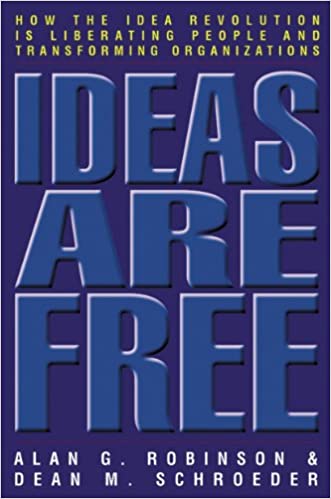Ideas Are Free – Alan G. Robinson and Dean M. Schroeder

“Ideas Are Free” explores the idea that employees are a valuable source of ideas for improving business processes and that organizations can harness this potential by creating a culture of continuous improvement.
Creating a Culture of Continuous Improvement
To truly harness the power of employee ideas, organizations must create a culture of continuous improvement. This means encouraging and rewarding employees for sharing their ideas, and making it easy for them to do so.
Leaders Must Walk the Talk
Leaders play a critical role in creating a culture of continuous improvement. They must model the behaviors they want to see in their employees, and actively support and promote the idea management process.
Celebrate Successes
Celebrating successes is an important way to reinforce the importance of employee ideas and to keep employees motivated and engaged. Organizations should acknowledge and reward employees for their contributions and successes, and should regularly communicate the impact of employee ideas to the broader organization.
Continuous Improvement is a Journey
Continuous improvement is not a destination, but a journey. Organizations should be committed to ongoing improvement, and should continuously seek out ways to engage employees and improve their idea management processes.
Focus on Solutions, Not Problems
To encourage positive employee engagement, organizations should focus on solutions rather than problems. By framing improvement initiatives in terms of solutions, employees are more likely to feel inspired and motivated to contribute.
Employee Involvement is Key
Employee involvement is crucial to creating a culture of continuous improvement. When employees feel valued and empowered to contribute, they are more likely to share their ideas and take ownership of the improvement process.
The Importance of Feedback
Feedback is crucial to the success of any idea management system. Organizations should establish clear channels for providing feedback to employees and should ensure that feedback is timely, constructive, and actionable.
Embrace Failure as a Learning Opportunity
Failure is an inevitable part of the improvement process. Organizations should encourage employees to take risks and try new things, and should view failures as valuable learning opportunities.
The Power of Small Improvements
Small improvements can add up to big gains over time. By encouraging employees to focus on small, incremental changes, organizations can achieve significant improvements in efficiency, quality, and customer satisfaction.
A Systematic Approach to Idea Management
Effective idea management requires a systematic approach. Organizations should establish clear processes for submitting, evaluating, and implementing ideas, and ensure that employees are trained on how to participate in the system.

